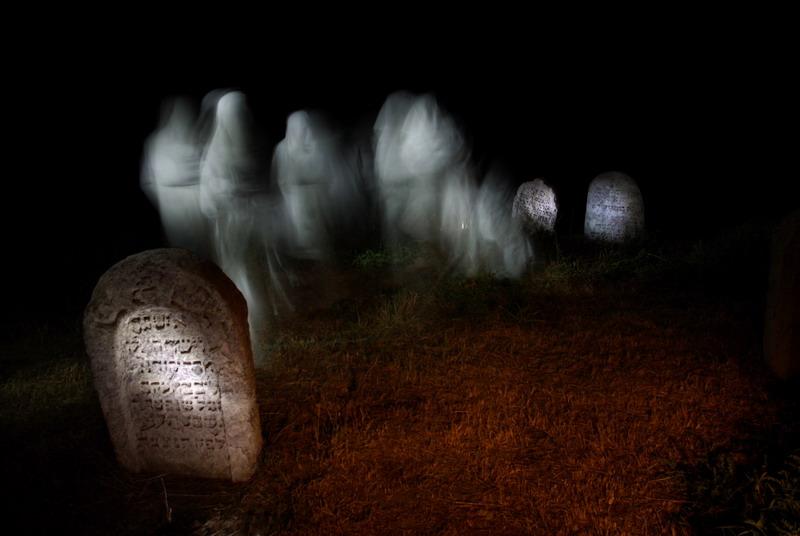
That’s to say: benefits can come from praying for the souls at a graveyard or columbarium, though obsession at such a place, or worse a trip there out of ghost-hunting thrill-seeking, can certainly draw negative “energy” (we prefer the term “spirits”).
It is well-known in both Church and parapsychological annals that earthbound spirits — purgatorial ones, or others that have not made the transition into Christ’s Light, and remain attached to the world and people in it — can linger, and that sometimes those earthly attachments manifest at graves.
It seems logical. And the problem is that such souls are not always the amicable type, especially if occultists have performed rituals (these days, too often the case).
Spirits of the deceased are often very unbalanced, and more often than we know, exert an influence on us.
Again, that can be good, if the spirit was balanced and is simply making a quick excursion from Heaven, thanking us for prayer or coming to our aid as we pray.
But to say caution is in order is an understatement.
Deliverance priests will tell you that negative souls (along with demonic ones) can follow generations.
When one family member dies, a spirit can latch onto or hook into next in line.
This is why damaging inclinations, illnesses, and incidents often repeat in families. More on this later this week.
Are such beliefs Catholic? Christian? Jesus spoke of “unclean spirits” (even using the word “ghost”) and St. Augustine recounted the story of a haunted house (City of God, Book XXII, chapter eight). Bishops have reported apparitions. So have priests. Thomas Merton encountered the apparition of a deceased sister.
In fact, many cardinals, bishops, priests, and nuns have been witness to apparitions or other “ghostly” happenings. By the year 1000, says historian Andrew Coynes, “stories of restless spirits of the departed, of ghostly violations of the traditional boundaries between the living and the dead, began to be recorded even by eminent churchmen.”
Spirits roaming about or hanging out at cemeteries may similarly attach (in our discernment), making it important to keep a visit for deceased with eyes upward to God (not to the dirt below one’s feet, or the vault of a columbarium).
Souls do not reside in the earth, not the balanced kinds.

Many problems have been linked to graveyards, particularly Native American ones, due to the pagan rituals conducted and in some instances curses (directing the decease to ward off foreigners). This is not to besmirch Native Americans (most of whom would have nothing to do with curses of any sort).
While the Church does not outright reject the notion of disincarnate or disembodied spirits (as they are also called), neither does it categorically accept them.
We must respect those who interpret Church statements as arguing against such spirits, as well as maintain a guard against those of a New Age or even occult slant of who delve
into this realm, which presents danger.
Because Satan can so easily fool our senses (he loves Halloween), we are well advised to look upon all ghostly events with great skepticism as to the idea of whether they come from God. “First we must recognize the great possibility that we are imagining things,” noted Brother Ignatius Mary in St. Michael’s Scriptorium (Seven Kinds of Ghosts). “The human mind has great imagination capacity and we can psyche ourselves into seeing things that are not there or to misinterpret optical illusions. Second, we must always presume that we may be tricked by Satan and what we are seeing is a demon in disguise or Satan taking advantage of our overactive imaginations or optical illusions. A Godly apparition will never contradict any public revelation. A Godly apparition will never lead you to disobey your elders, superiors, or the Church (so we need to be aware of Church teaching and the like). Not candy-corn stuff.
Although meeting a spirit is scary, a Godly apparition will lead you to peace. A Godly spirit will always and without question affirm the Lordship of Jesus Christ. Thus we need to test the
spirit with the formula of 1 John 4:1-3.” I believe that when they are around, deceased spirits can have a great effect on us—positively or negatively, too often the latter.
[Footnote from The Spirits Around Us: “Noted Saxon Bishop Theitmar of Merseburg (975-1018), “It is not right and proper to dwell too much upon the affairs of the dead, but rather, as St. Paul reminds us (Romans 12:3) to think soberly upon such matters. On the other hand, because the testimony of two or three witnesses is worth recording, I have written down accounts of events which have happened recently, in order that the unbelieving might know that the words of the prophets are true: ‘Thy dead shall live, O Lord’ (Isaiah 26:19, and also ‘The dead arise, who are in their tombs; they will hear the voice of the Son of God, and abundantly’ (John 5:28).”
“Continued this ancient bishop: ‘It is noteworthy that, whenever such events occur and are witnessed by the living, they signify that something momentous is about to happen. For instance, I was myself in my courtyard one December when, as the cock crowed, a great light came from the church, filling the whole of the atrium, and an immense sound—a kind of groaning—was heard. My brother witnessed this with his attendants and others who were gathered there, and a chaplain sleeping nearby heard the sounds.'”]
[resources: [Michael Brown retreat, October 21 and The Spirits Around Us]




